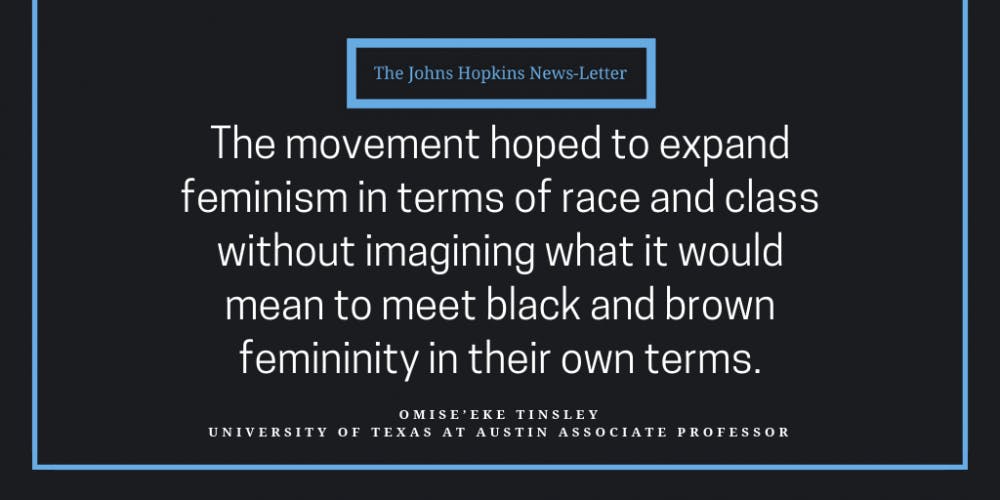Omise’eke Tinsley, an associate professor of African and African Diaspora Studies at the University of Texas at Austin, discussed pop culture icons and black femme futures at an event titled, “PYNK: Black Femme in Slavery’s Archive,” this Wednesday in Gilman 388. The presentation was the closing event of the Sex and Slavery Lab at Hopkins.
Tinsley’s scholarly work has largely focused on Caribbean and African American creative and artistic production. Last November, she published Beyoncé in Formation: Remixing Black Feminism, which deliberates on creative possibilities for black queer femme-ininity during President Trump’s presidency through a reading of Beyoncé’s Lemonade.
In her lecture, Tinsley addressed intersectional feminism in the context of the Women’s March, which began with protests against Trump’s inauguration, and said that feminism should not empower people based on their genitals.
“The pussy hats in protest of Trump’s inauguration were bright and beautiful — yes, but it was not empowering for everybody,” Tinsley said. “My genitals are not a pussy, and my genitalia is not pink. The movement hoped to expand feminism in terms of race and class without imagining what it would mean to meet black and brown femininity in their own terms.”
As a self-identified woman-passing femme, Tinsley examined what a politicized femme identity entails in contemporary America.
“When I try to explain black femme to family members, friends and students, I am met with analogies to heteronormativity or silent responses,” she said.
Tinsley explained her complicated feelings on analogies. She sees them as politically useful and enjoys figurative language, but also wants black femmes to exist on their own, without having to be parallel to something else.
“Both pink and love have often been used as analogies and a configuration to explain black femme character. This was a source of huge pleasure for me, as a femme who loves figurative language. My accumulation of metaphors, including fanciful markers of my femme-ness — my collection of statement earrings and my platform shoes — impact culture,” Tinsley said.
Tinsley expressed appreciation for participants in the Women’s March who used their platform to include femmes and other queer identities, such as Janelle Monáe and Janet Mock. She discussed how both Monáe and Mock released visual texts to express their black and queer femme-ininity and their relationship to vulnerability.
“I want to dwell on the sense of playfulness as Monáe’s expression of vulnerability in her imagination of black femme freedom,” Tinsley said. “In her music video, Monáe is exploring black femme-ininity — the psychological interiority and not just the inside of bodies. In the current political moment, vulnerability stands to be rethought as a daring act, pierced to the core as a deeply political and social issue.”
Jessica Marie Johnson, a professor in the History Department at Hopkins, was the main organizer for the event. She hoped that the event could encourage new approaches to academic studies.
“The overarching impulse is to introduce young scholars to new and interesting concepts that may form how they are thinking about the work and have it challenge it in ways they may not have expected,” Johnson said.
Johnson said that black femme and sexuality are relevant to all fields of study, situated between scholarship, activism and personal identity.
“Thinking through our personal relationship to the work is also part of the work,” Johnson said. “For students who are juggling all of these spheres, I want to say that it is very possible to do work that you love, that is rich and also have it be rigorous.”
Brooke Lansing, a History graduate student who attended the event, concurred with Johnson. Lansing said she was interested in walking the line between personal and academic spheres in her scholarly pursuits.
“What Dr. Tinsley was saying about writing and thinking not necessarily according to disciplinary guidelines was something I wanted to think about,” said Lansing. “I would love to be able to articulate the reasons why I chose my topic and incorporate emotions into my work. What struck me about Dr. Tinsley’s story is that she’s so open about having to not always heed advice, to go with her intuition and to let her feelings guide her as opposed to just satisfying requirements.”





